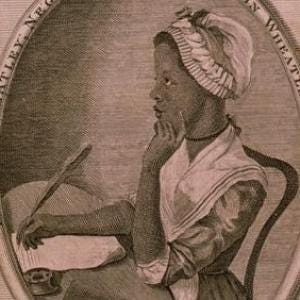Today In Black History
Phillis Wheatley, 1st African American Writer who was Published
Issue #522 Today In Black History, Tuesday, March 5, 2024
Today’s Black History WOW!
Phillis Wheatley was born in 1753 and was seized from Senegal/Gambia, West Africa (the same area from which Kunte Kinte, the ancestor of Alex Haley, the author of “Roots” was stolen) when she was about seven years old. She was transported to the Boston docks with a shipment of “refugee” slaves, who because of age or physical frailty were unsuited for rigorous labor in the West Indian and Southern colonies, the first ports of call after the Atlantic crossing.
She was purchased by the Wheatley family in Boston, where she was taught to read and write. Her first name is spelled with an “i” instead of a “y” because “Phillis” was the name of the slave ship on which she was brought to the Colonies.
Wheatley's talent for poetry was evident from a young age, and she began writing and publishing her work while still a teenager. Her poetry often focused on themes of slavery, religion, and freedom. In 1773, her first book of poetry, "Poems on Various Subjects, Religious and Moral," was published in London. This made her the first African American and one of the first women to have a book published.
Wheatley was the abolitionists’ illustrative testimony that Blacks could be both artistic and intellectual. Her name was a household word among literate colonists and her achievements were catalysts for the fledgling antislavery movement. However, the first American edition of this book was not published until two years after her death.
In addition to classical and neoclassical techniques, Wheatley applied biblical symbolism to evangelize and comment on slavery. For instance, “On Being Brought from Africa to America,” the best-known Wheatley poem, chides the Great Awakening audience to remember that Africans must be included in the Christian stream: “Remember, Christians, Negroes, black as Cain, /May be refin’d and join th’ angelic train.”
Despite facing prejudice and discrimination, Wheatley was praised for her intellect, talent, and ability to write with elegance and grace, more in Europe than in America during her lifetime. Wheatley's poetry was celebrated for its moral and religious themes, as well as its classical style and form.
Phillis Wheatley died, uncared for, destitute, and alone on December 5, 1784, at the young age of 31.
Primary Reference: https://www.poetryfoundation.org/poets/phillis-wheatley
Today In Black History
- In 1770, escaped slave Crispus Attucks was the first person killed in the Boston Massacre.
- In 1845, President John Tyler signed the joint resolution of Congress to admit Texas as a slave state.
- In 1858, abolitionists established “Crispus Attucks Day” in Boston.
- In 1875, Blanche Bruce Kelso was sworn into the U.S. Senate, becoming the first Black person to serve a full six-year Senate term.
- In 1897, the American Negro Academy was founded by Alexander Crummel to promote higher education through literature, science, and the arts.
- In 1981, the U.S. government granted Atlanta $1M to search for the “black boy murderer.”
- In 1985, the USPS issued the Dr. Mary McLeod Bethune commemorative stamp as the 8th stamp in its Black Heritage USA series. Dr. Bethune was the founder of Bethune-Cookman College and the National Council of Negro Women.
- In 2017, then-president Donald Trump falsely and without evidence accused former President Barack Obama of wiretapping Trump Tower during the 2016 presidential campaign.
- The “Comments” feature has been disabled. Instead, let’s discuss these facts in our community on Substack Notes. You can also read other Substack publications without subscribing to them when you join Notes.
This post is free to read/listen to for three days after publication. To have 365 24/7 access to all our posts and podcast episodes and financially support “We Are Speaking” for no more than $5 per month, please subscribe at the paid level. You will receive a 7-day FREE trial!






